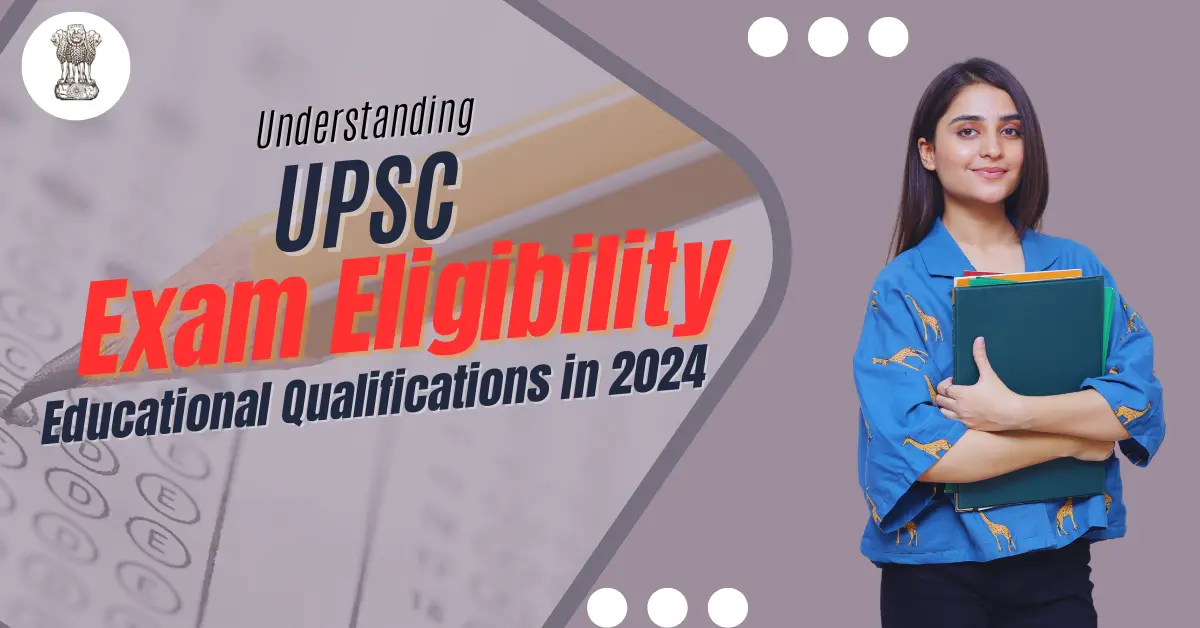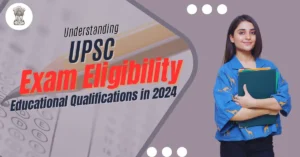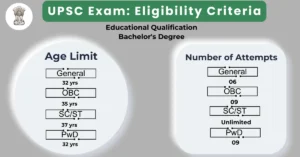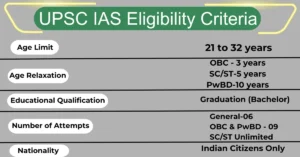
Understanding UPSC Exam Eligibility Educational Qualifications in 2024
- 74
- 0
- 0
UPSC exam eligibility educational qualification
Are you considering pursuing a career in the esteemed civil services of India? If so, you’ve likely heard of the Union Public Service Commission (UPSC) examination, which serves as the gateway to a career in the Indian Administrative Service (IAS), Indian Police Service (IPS), Indian Foreign Service known (IFS), and some other civil services. But what exactly are the educational qualifications required to be eligible for this rigorous examination is the main key.
Introduction
The UPSC Civil Service examination stands as one of the most esteemed and sought-after tests nationwide. Despite its prestige, fierce competition characterizes recruitment, making it highly selective. Surprisingly, the number of sincere applicants remains consistent yearly, reflecting the exam’s enduring allure. Understanding the UPSC Eligibility criteria is paramount. This article offers comprehensive insights into nationality, age limits, educational prerequisites, attempt allowances, age relaxations, and medical and physical standards to facilitate candidates’ preparations without encountering last-minute hurdles.
The UPSC exam eligibility educational qualification
1. Nationality:
Before we go into educational qualifications, it’s crucial to establish that candidates must be either:
a)A citizen of India, or
b) A subject of Nepal, Bhutan, or a person of Indian origin who has migrated from Pakistan, Myanmar, Sri Lanka, Kenya, Uganda, Tanzania, Zambia, Malawi, Zaire, Ethiopia, or Vietnam with the intention of permanently settling in India.
2. Age Limit: The minimum and maximum age limits for candidates vary depending on the category they belong to. Typically, individuals applying for civil services must fall within the age bracket of 21 to 32 years old as of August 1st of the examination year. However, certain relaxations apply to candidates belonging to reserved categories.
The UPSC exam eligibility criteria for 2024, effective as of August 1st, 2024, includes specific age limits for candidates based on their category:
General Category (Gen): Candidates must be at least 21 years old to apply, with a maximum age limit of 32 years.
Other Backward Classes (OBC): Individuals from this category can apply between the ages of 21 and 35 years.
Scheduled Castes (SC) and Scheduled Tribes (ST): The age range for SC/ST candidates is from 21 to 37 years.
Persons with Benchmark Disability (PwBD): For PwBD candidates, the minimum age requirement is 21 years, with a maximum age limit of 42 years.
3. Educational Qualifications:
Now, let’s know about the UPSC exam eligibility educational qualification.
a) For the Indian Administrative Service (IAS) and the Indian Police Service (IPS): A candidate must hold a degree from any recognized university or possess an equivalent qualification.
b) For other services:
Candidates must have a degree from universities recognized by Acts of the Central or State Legislature in India or institutions established by Acts of Parliament. Alternatively, degrees from institutions deemed as universities under Section 3 of the University Grants Commission Act, 1956, are accepted for eligibility in civil services exams.
c) Candidates who have appeared or intend to appear for the qualifying examination and are awaiting results are also eligible to apply for the Preliminary Examination. However, such candidates must produce proof of passing the requisite examination along with the application for the Main Examination.
4. Number of Attempts:
There are restrictions on the number of attempts a candidate can make. However, these restrictions vary depending on the category the candidate belongs to. For example, candidates belonging to the General category can attempt the exam a maximum of six times, while there are relaxations for candidates from other categories.
5. Physical Standards:
For certain services like the Indian Police Service (IPS), candidates must meet specific physical requirements outlined by the UPSC.
6. Other Eligibility Conditions:
Apart from the educational qualifications mentioned above, candidates must also fulfill other eligibility conditions specified by the UPSC, such as citizenship, age limits, and physical standards.
7. Reservation Policy:
The UPSC follows the reservation policy laid down by the Government of India for candidates belonging to Scheduled Castes (SC), Scheduled Tribes (ST), Other Backward Classes (OBC), Economically Weaker Sections (EWS), and Persons with Benchmark Disabilities (PwBD). Relaxations in age limits, number of attempts, and other criteria are provided to candidates belonging to these categories.
8. Some Exception:
If you are in your final year of undergraduate studies or are awaiting the results of your bachelor’s degree examination, you are eligible to apply for the UPSC Civil Services Examination (CSE) prelims.
After clearing the prelims and proceeding to the mains examination, you must provide proof of your graduation by submitting your bachelor’s degree passing certificate. In exceptional cases, the UPSC may permit candidates without a degree from a recognized universities to appear for the CSE if they have completed their final year examination from an institution approved by the UPSC.
Candidates with professional or technical qualifications equivalent to recognized degrees are also eligible for the exam. For individuals who have passed the final examination of MBBS or any other medical course but have not completed their internship, provisional permission is granted to appear for the UPSC mains upon submission of a certificate from their university confirming the completion of the final medical exam.
During the interview round, candidates must possess an original degree or a certificate from their university verifying the completion of all requirements, including the internship, for the degree.
Summary
Candidates must be Indian citizens or meet specific nationality requirements. Age limits, educational qualifications, and attempt restrictions apply. Physical and medical standards vary per service. Adherence to application procedures is crucial. Stay updated on any changes by referring to official UPSC notifications.
It’s essential for aspirants to thoroughly understand the eligibility criteria before applying for the UPSC examination. Missing out on any of the specified requirements could lead to disqualification from the examination process. Additionally, candidates should stay updated with any changes or amendments made by the UPSC to the eligibility criteria.
Conclusion
In conclusion, the UPSC examination is a highly competitive and prestigious examination that demands thorough preparation and adherence to strict eligibility criteria. By understanding the educational qualifications and other eligibility conditions outlined by the UPSC, aspirants can better prepare themselves for this challenging yet rewarding journey towards a career in Indian civil services.
FAQs
1. What is the qualification for UPSC education?
The qualification for the UPSC (Union Public Service Commission) examination includes holding a degree from a university recognized by Acts of the Central or State Legislature in India, or from institutions established by Acts of Parliament. Additionally, degrees from institutions deemed as universities under Section 3 of the University Grants Commission Act, 1956, are accepted.
2. Can the 12th pass apply for UPSC?
No, 12th-pass individuals cannot apply for the UPSC exam. A graduation degree from a recognized university is the minimum qualification required for eligibility in the UPSC exams. However, preparation can commence after the 12th board exams.
3. Which degree is best for UPSC?
A Bachelor of Arts (BA) degree is indeed beneficial for aspiring IAS officers. BA programs often cover topics relevant to the UPSC Civil Services Examination (CSE) syllabus, particularly in humanities and social sciences. These subjects provide a strong foundation for understanding the diverse aspects of society and governance.
4. What is the essential qualification for UPSC?
The essential qualification for the UPSC (Union Public Service Commission) examination is a bachelor’s degree from a recognized university or institution. Additionally, candidates must meet other eligibility criteria specified by the UPSC for the specific examination they are applying for.
5. Who is the youngest IAS officer in India?
The youngest IAS officer in India was Ansar Ahmad Shaikh, who became an IAS officer at the age of 21 in 2016. He successfully passed the UPSC Civil Services Examination on his initial try.
Also Read:
Explore the Best Career Options After 12th: A Comprehensive Guide In 2024
References:



